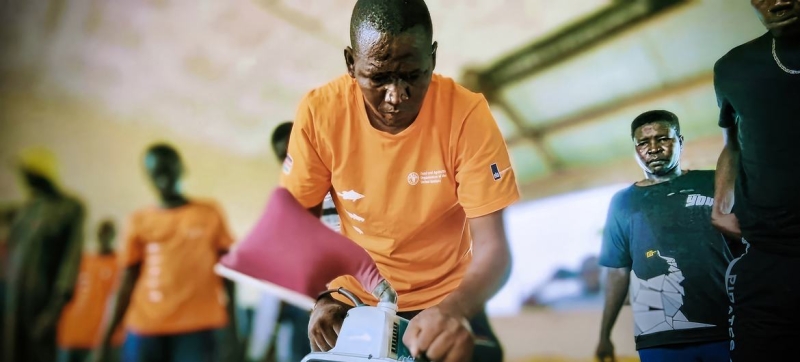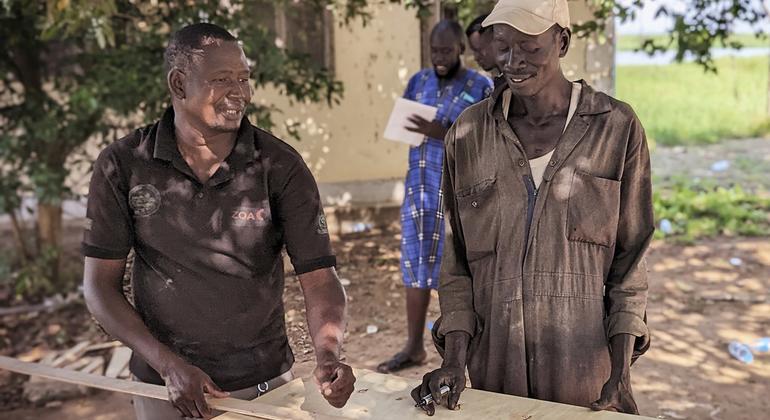
The project teaches participants how to coat canoes with epoxy resin. FAO teaches South Sudanese fishermen how to build boats that are stronger and save trees Economic development
Fishing boats in South Sudan are traditionally made from local hardwood, but they only last five years and become heavier as they absorb water, making them inefficient and unsafe. The Food and Agriculture Organization of the United Nations (FAO) is teaching fishermen how to build boats that save trees and make fishing safer.
Five men stand around an upside-down wooden boat, vigorously sanding its hull. They are building a canoe to fish on the White Nile in South Sudan.
Traditionally, fishing boats in this African country are made from locally grown, hardwoods such as mahogany and teak. Although strong, these traditional boats absorb water, making them up to 80 percent heavier. This makes them slower to accelerate, more difficult to paddle, and fuel-hungry when equipped with a motor. Their lifespan is less than five years.
A project run by the Food and Agriculture Organization of the United Nations (FAO) is partly aimed at changing this, introducing techniques that will enable boat makers in Bor and Terekek to improve their traditional boat designs so that they last longer, reducing the need to cut down trees. Unsustainable, large-scale logging for export has already led to deforestation, making hardwoods increasingly scarce in the area.
Coating a canoe with epoxy extends its lifespan to 20 years or more, helping to combat deforestation by requiring boats to be replaced less frequently. It also means cheaper wood can be used instead of hardwoods.
In addition, epoxy-treated boats are lighter than traditional boats, making them easier to maneuver in the narrow channels of the White Nile and the challenging conditions that fishermen sometimes face.

Training in these improved canoe-making techniques is part of a Netherlands-funded project to strengthen the resilience of fishing communities in South Sudan, which is scheduled to run from 2020 to the end of 2024.
In addition to boat-building, the project also trains fishermen in the use of equipment for fish handling, processing and preserving. This solves the problem of lack of refrigeration and the resulting food loss when unsold fish has to be thrown away at the end of the day.
“This project has given local boat makers a market advantage while reducing the environmental impact of cutting down trees for their livelihoods,” said FAO fisheries expert Matt Walsh.
Training local boat makers
Epoxy resin for boat coating costs four times more than the more common polyester resin, but lasts longer. Until now, epoxy resin has been used in Formula 1 cars and yachts, but the project has created a local supply chain, bringing the price down to a more affordable level.
FAO has trained boat builders on how to mix the resin, how much to use, and how to handle it safely.
Using epoxy resin means that locally made boats can compete with imported fibreglass boats, supporting local boat builders.
Participants in this FAO project learned more than just how to epoxy a canoe. They also learned how to make boat joints, draw up plans, and work with paper models. FAO experts also helped participants expand their manufacturing capabilities by teaching them basic mathematics and how to apply a grid to wood boards so that identical parts could be cut out accurately. The training is designed to improve, not change, traditional methods.
The materials provided by FAO enabled the project participants to build 100 boats – about six per person.
Local Economic Development
The FAO project focused on local boat makers and improving their skills. They were helped to develop a business selling their products to international organisations. Along with the creation of a supply chain for the epoxy resin, this gives the boat makers the opportunity to stay in business.
“There are already signs of demand for the improved boats. Fishermen are willing to pay more for them; “People are even interested in them from 100 kilometers away. We hope that these efforts will help create a domestic industry that can compete with imported products,” said Matt Walsh.
There are also plans to provide training in building advanced boats using epoxy resin to other African countries, which will help spread the benefits of sustainability and safety across the continent.
